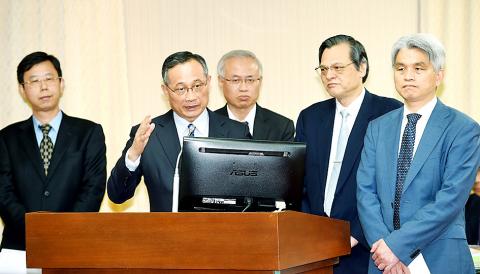The Ministry of Justice’s Investigation Bureau is investigating 33 cases of alleged Chinese funding to candidate campaigns for the Nov. 24 elections, bureau Director-General Leu Wen-jong (呂文忠) said yesterday.
Asked by Chinese Nationalist Party (KMT) caucus deputy secretary-general William Tseng (曾銘宗) during a meeting of the legislature’s Internal Administration Committee whether the suspect funds were coming directly from the Chinese government or affiliated organizations, Leu said: “You could say that.”
Many of the cases involved donations made through Taiwanese businesses in China, Leu said.

Photo: Fang Pin-chao, Taipei Times
When Tseng asked if any of the donations could have simply been made by those businesses, without Chinese help, Leu said the bureau has evidence that China is attempting to influence the elections by funding certain candidates and is preparing cases for prosecution.
If Taiwanese businesses were making the donations on their own, they would be legal, but the Political Donations Act (政治獻金法) and the Act Governing Relations Between the People of the Taiwan Area and the Mainland Area (台灣地區與大陸地區人民關係條例) prohibit donations made by Chinese individuals or entities, Leu said.
China has been attempting to circumvent these laws by making donations in other ways, such as through China-based Taiwanese businesses, with the money coming from China’s Taiwan Affairs Office, he said.
Four cases that are being investigated by prosecutors in Taipei and Changhua, Yunlin and Pingtung counties are being treated as alleged vote-buying, the bureau said.
Leu said Beijing had also invited some influential community leaders to visit China on all-expenses-paid trips in return for their backing of China’s favored candidates, but he would not give more details when pressed by committee members.
The bureau has identified certain candidates it believes are being funded by Beijing and it is building cases against them, he added.
The Taiwan High Prosecutors’ Office has conducted raids on two underground money exchanges, he said.
The raids were part of preparations for next month’s meeting of the Asia/Pacific Group on Money Laundering and aimed at cracking down on campaign violations, as some money meant to influence the elections has been flowing into the exchanges from China, he said.
Mainland Affairs Council Minister Chen Ming-tong (陳明通) told the committee that the council was already looking into the cases, but needed more specific information from the bureau.
Meanwhile, Minister of Justice Tsai Ching-hsiang (蔡清祥) called on the police to step up measures against foreign interference in next month’s elections.
Additional reporting by CNA

‘DANGEROUS GAME’: Legislative Yuan budget cuts have already become a point of discussion for Democrats and Republicans in Washington, Elbridge Colby said Taiwan’s fall to China “would be a disaster for American interests” and Taipei must raise defense spending to deter Beijing, US President Donald Trump’s pick to lead Pentagon policy, Elbridge Colby, said on Tuesday during his US Senate confirmation hearing. The nominee for US undersecretary of defense for policy told the Armed Services Committee that Washington needs to motivate Taiwan to avoid a conflict with China and that he is “profoundly disturbed” about its perceived reluctance to raise defense spending closer to 10 percent of GDP. Colby, a China hawk who also served in the Pentagon in Trump’s first team,

SEPARATE: The MAC rebutted Beijing’s claim that Taiwan is China’s province, asserting that UN Resolution 2758 neither mentions Taiwan nor grants the PRC authority over it The “status quo” of democratic Taiwan and autocratic China not belonging to each other has long been recognized by the international community, the Mainland Affairs Council (MAC) said yesterday in its rebuttal of Beijing’s claim that Taiwan can only be represented in the UN as “Taiwan, Province of China.” Chinese Minister of Foreign Affairs Wang Yi (王毅) yesterday at a news conference of the third session at the 14th National People’s Congress said that Taiwan can only be referred to as “Taiwan, Province of China” at the UN. Taiwan is an inseparable part of Chinese territory, which is not only history but

CROSSED A LINE: While entertainers working in China have made pro-China statements before, this time it seriously affected the nation’s security and interests, a source said The Mainland Affairs Council (MAC) late on Saturday night condemned the comments of Taiwanese entertainers who reposted Chinese statements denigrating Taiwan’s sovereignty. The nation’s cross-strait affairs authority issued the statement after several Taiwanese entertainers, including Patty Hou (侯佩岑), Ouyang Nana (歐陽娜娜) and Michelle Chen (陳妍希), on Friday and Saturday shared on their respective Sina Weibo (微博) accounts a post by state broadcaster China Central Television. The post showed an image of a map of Taiwan along with the five stars of the Chinese flag, and the message: “Taiwan is never a country. It never was and never will be.” The post followed remarks

INVESTMENT WATCH: The US activity would not affect the firm’s investment in Taiwan, where 11 production lines would likely be completed this year, C.C. Wei said Investments by Taiwan Semiconductor Manufacturing Co (TSMC, 台積電) in the US should not be a cause for concern, but rather seen as the moment that the company and Taiwan stepped into the global spotlight, President William Lai (賴清德) told a news conference at the Presidential Office in Taipei yesterday alongside TSMC chairman and chief executive officer C.C. Wei (魏哲家). Wei and US President Donald Trump in Washington on Monday announced plans to invest US$100 billion in the US to build three advanced foundries, two packaging plants, and a research and development center, after Trump threatened to slap tariffs on chips made